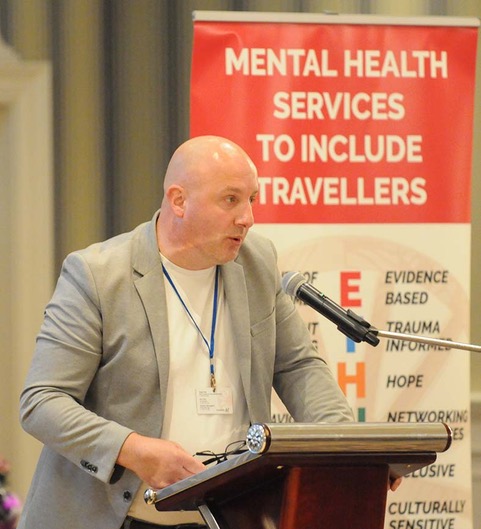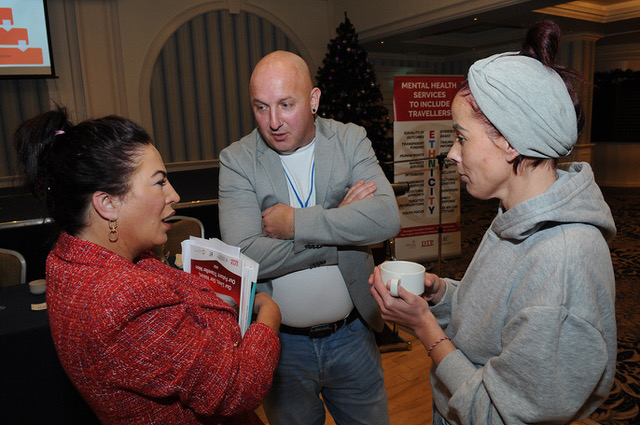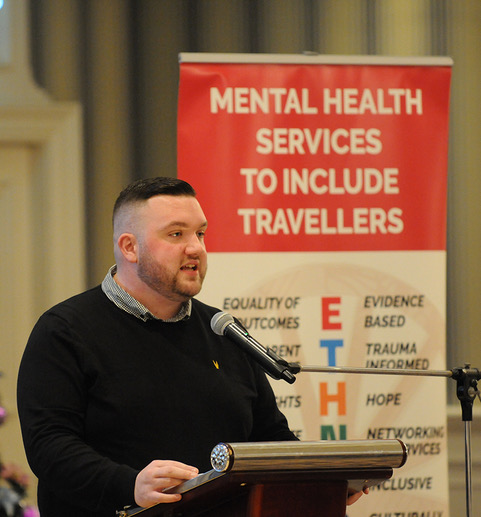
Seven out of the ten Traveller men who participated in an investigation into Traveller men’s health and wellbeing experienced suicidal ideation or attempted suicide in the past, according to a comprehensive study of Traveller men’s mental health in Donegal.
The Donegal Travellers Project (DTP) commissioned the first Traveller-led research which was carried out by David Friel from Ballyare, Letterkenny, and launched at the Clanree Hotel, on Monday.
The purpose of the research was to explore the issues, needs and interests of Traveller men who experience mental health challenges between the ages of 18 and 65, in Donegal.
Speaking at the launch, Mental Health Coordinator for Travellers in the region, Ita Madden spoke of the importance of the research. She congratulated the Donegal Traveller Project for securing the funding for the work and said it would act as a guide for years to come. She added that a lot more work was to be carried out in the area.

DTP employee, Michael Mongan, said the rate of suicide is 7 times higher in Traveller men than in the settled population. He commended the research which he said was carried out by and with Traveller men.
Edward Friel said the body of work supported Traveller men and afforded them the opportunity to give feedback on their lives and what impacts their lives.
Key findings from this research indicate that Traveller men’s early childhood experiences of racism, segregation and low expectations have a deep-rooted and long-term impact on their mental health.
Mr Friel said another key factor was accommodation deprivation and homelessness which correlated with Traveller man’s experience of poor mental health, anxiety, worry, stress and low self-esteem.
Traveller men identified unemployment and subsequent poverty as significant determinants of their mental health.
Mr Friel read a quote taken from one Traveller who had participated in the research: “Because I am a Traveller and have mental health problems, I couldn’t even get a job cutting grass. They think Travellers are thieves and untrustworthy. Then they think you are a nutter because you have mental health problems … If I was to get a job. I have no permanent address. There is no help for me really.”

Findings also indicate that unemployment and poverty had an adverse effect on Traveller men’s mental health.
One of the mental health risk factors was found to be bereavement and grief. Extensive research indicates that Irish Travellers have a higher death rate than the general population in Ireland. The report states: “Traveller men reported increased incidences of family bereavements, from suicide or sudden death, adversely impacted their mental health.”
The report outlines how one loss after another didn’t give men enough time to grieve and, at times, led to coping mechanisms such as drugs or alcohol and suicidal ideation or suicide attempts.
An older Traveller who participated in the research connects the death of his three children with his ongoing depression. He said: “I have lost three children. Two in tragic circumstances and one to suicide. It never gets easier. It’s hard to think that you have outlived your children. It’s not right … the death of my family has led to my depression … I will never forget finding [his child] in the caravan, too young. She was just there. No pulse … nothing.”
The study also found that Traveller men identified drugs and/or alcohol as a stimulus to ease distress and were consumed typically in isolation rather than in social social settings due to racism and discrimination. It was also found that drugs and/or alcohol as a factor in their experiences of suicidal ideation or suicide attempt but not as the sole cause.
The research found that the factors leading to feelings of suicide were multidimensional with many factors, which are outlined in the report, occurring simultaneously.
Most Traveller men reported having negative experiences with their GP and statutory and non-statutory mental health services, according to the report. As a result there exists a general mistrust of the GP and mental health services, and uptake of these services is low, even in cases where Traveller men exhibited factors associated with increased risk of suicide.
Speaking at the launch, Mr Friel said that the findings of the study identified that the cumulative and simultaneously occurring experiences of racism, discrimination and social exclusion had a profound impact on Traveller men’s mental health which resulted in Traveller men experiencing feelings of shame, low-self worth and disfranchisement from society all of which have been connected with poor mental health experiences and outcomes among minority groups.
Structural racism in the form of racial/ethnic policing from the gardaí adversely impacted Traveller men’s mental health, he found. Experience of being subject to racial slurs, wrongful convictions and involuntary interactions were identified as chronic stressors that led to Traveller men experiencing psychological distress and poor mental health.
Mr Friel read out the testimony of a Traveller man who had participated in his research, he said: “I have had nothing but harassment from the police. On a very odd day, they will just drive past you on the street without stopping you. You get asked what your name is and then which surname are you. I feel they want to get a rise out of you, a reason to arrest you or charge you with something. I remember once I got arrested, I was having a [mental health] episode, one of them said to me ‘don’t try pulling that card, you’re acting the pr*ck. The charge was dropped under the mental health act but the experience will stay with me till the grave.”
Covid was also found to have a significant impact on Traveller men’s health. Mr Friel acknowledged and praised the work and contribution of all those involved and who gave testimonies to him during his research.
In Donegal, the Traveller population fluctuates between 250 and 350 Traveller families. In August, 2020, the Donegal Traveller Project (DTP) identified 380 Traveller families living in Donegal and north Leitrim. DTP works across the entire county and has offices in Letterkenny and Ballyshannon. While 50 per cent of the Traveller population live in the Letterkenny area, their remit includes all families across Donegal to ensure inclusivity.
Key recommendations in the report
As a result of the research carried out into Traveller men’s mental health, Mr David Friel, found there is a need for an interagency working group to be established between Donegal County Council, Donegal Travellers Project (DTP) and other working groups. From this group, he said, a response should be developed with clear targets, actions and resources, to address the needs that arise from intersectional impact of Travellers experiencing homelessness and mental health challenges.
It was also recommended that there is a specific focus on Traveller men’s health through targetted initiatives.
Educators at all levels should develop a more robust anti-oppressive and anti-discriminatory practice, Mr Friel writes in his report.
The study’s findings suggest a need for a HSE-funded position of a peer Traveller mental health worker to be located in Donegal. It is recommended that primary care teams within the region uptake public sector duty training, cultural-competency, anti racism and discrimination training to improve the experience of Traveller men availing of their support crises, Mr Friel said.
It is also envisaged that primary care teams work collaboratively with DTP to deliver a positive mental health awareness and suicide prevention campaign among Traveller men. The stigma of mental health remains among Traveller men and more work needs to be done to alleviate this belief.

In line with Section 42 of the Irish Human Rights and Equality Act, it is recommended, all public services should uptake public sector equality and human rights training.
It is also recommended that An Garda Síochána should establish a dedicated policing plan in consultation with the DTP to improve a better relationship with the Traveller community. A rights-based campaign and association awareness tools tailored specifically toward Traveller men should be developed with the aim of restorative dialogue, trust and reciprocity.
“There are radical possibilities for this research and its methodology to be expanded locally, regionally and nationally to ascertain the mental health challenges experienced by Traveller men, women and children by having a broader sample and intersectional lens to understand the multi-dimensional factors impacting their lives.
Subscribe or register today to discover more from DonegalLive.ie
Buy the e-paper of the Donegal Democrat, Donegal People's Press, Donegal Post and Inish Times here for instant access to Donegal's premier news titles.
Keep up with the latest news from Donegal with our daily newsletter featuring the most important stories of the day delivered to your inbox every evening at 5pm.